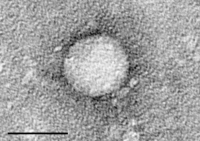
Photo from wikipedia
Limited data are available on direct‐acting antivirals for treating hepatitis C virus (HCV) infection in patients with severe renal impairment. The aim of this study was to evaluate the effectiveness… Click to show full abstract
Limited data are available on direct‐acting antivirals for treating hepatitis C virus (HCV) infection in patients with severe renal impairment. The aim of this study was to evaluate the effectiveness and safety of ombitasvir/paritaprevir/ritonavir (OBV/PTV/r) ± dasabuvir (DSV) ± ribavirin (RBV) in patients with stage 4 or 5 chronic kidney disease (CKD) and HCV genotype 1 or 4 infection in real clinical practice, and to investigate pharmacological interactions. This retrospective study included patients treated with OBV/PTV/r+DSV±RBV or OBV/PTV/r+RBV with CKD stage 4 (eGFR: 15‐29 mL/min/1.73m2) or 5 (eGFR<15 mL/min/1.73m2 or requiring dialysis) and HCV infection by genotypes 1 and 4 between April 2015 and October 2015 in nine Spanish centres. Sustained virological response at 12 weeks (SVR12) was assessed, and clinical and laboratory data, fibrosis stage, adverse events and pharmacological interactions were reported. Forty‐six patients were included: 10 (21.7%) had CKD stage 4 and 36 (78.2%) CKD stage 5. Seventeen (36.9%) had cirrhosis. SVR12 rate in the intention‐to‐treat population was 95.7%. Twenty‐one (45.6%) received RBV, which was discontinued in two (9.5%) patients. Anaemia (haemoglobin <10 g/dl) occurred in 12 patients (57.1%) with RBV vs 10 (40.0%) without RBV (P=.246). Renal function remained stable during antiviral therapy. Nine patients (19.5%) experienced serious adverse events unrelated to antiviral therapy. Concomitant medication was discontinued or modified in 41.3% of patients. In conclusion, the effectiveness of OBV/PTV/r±DSV±RBV in patients with CKD 4‐5 was similar to that observed in those with normal renal function and was not associated with severe adverse events.
Journal Title: Journal of Viral Hepatitis
Year Published: 2017
Link to full text (if available)
Share on Social Media: Sign Up to like & get
recommendations!